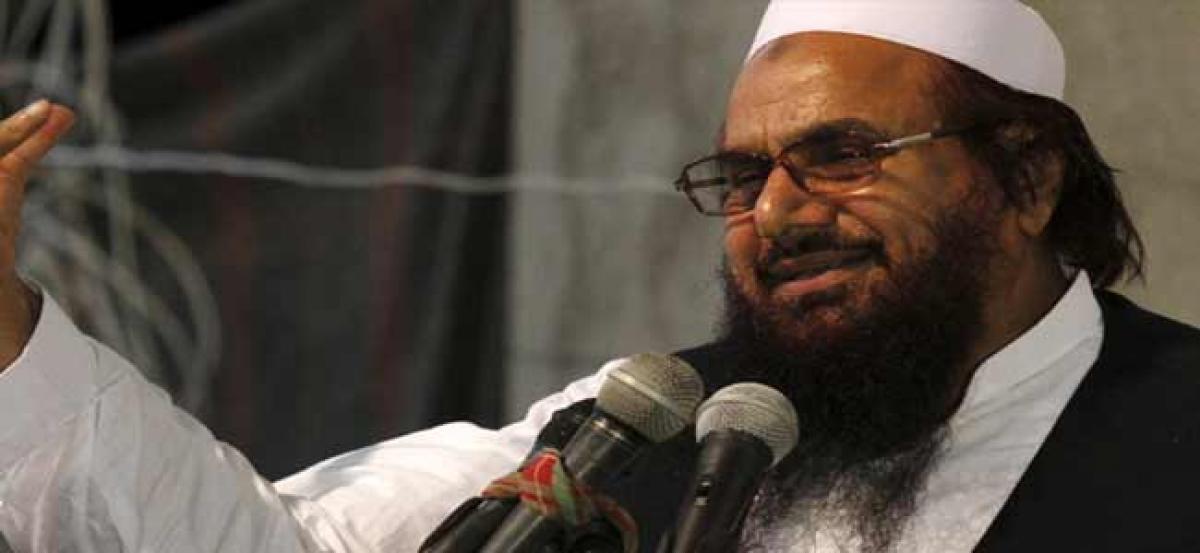Live
- Rajadhiraaj: Love. Life. Leela
- Students immerse in nature in Chilkur forest
- Sri Aurobindo’s vision: Bridging the gap for holistic human evolution
- Sri Radha Govinda Ratha Yatra conducted
- A feast of music, dance and drama
- Mohan Babu denies absconding amid legal controversy
- Swift City to boost industrial growth in Bengaluru
- Allu Arjun walks out free after spending night in jail
- Congress harbours no grudge against any actor: TPCC chief
- Allu Arjun meets Upendra after release from prison, wishes for his ‘UI’ film
Just In

The release of Jamaat-ud-Dawa (JuD) Chief Hafiz Saeed and former Pakistan president Parvez Musharraf\'s open admission of his liking towards the former and the Lashkar-e-Taiba (LeT) will win Islamabad foes, more than friends, says an expert.
Amsterdam [The Netherlands]: The release of Jamaat-ud-Dawa (JuD) Chief Hafiz Saeed and former Pakistan president Parvez Musharraf's open admission of his liking towards the former and the Lashkar-e-Taiba (LeT) will win Islamabad foes, more than friends, says an expert.
Paul Stott, a senior teaching fellow at the Centre for International Studies and Diplomacy at SOAS University of London, has, in an article titled 'Hafiz Saeed: A Series of Curious Developments', opined that the view of Pakistan's courts - that there was no evidence to link Saeed to Mumbai - was unwelcome news for Indo-Pakistani relations, "and may even have had United States President Trump's trigger finger hovering over the Twitter icon on his mobile phone."
Case in point - last week's meeting of the US Secretary of State for Defence, General James Mattis, with Pakistan's Army Chief, General Qamar Javed Bajwa in Rawalpindi. They had much to discuss.
"Both parties were too polite, in public at least, to comment on the release of long term jihadist Hafiz Saeed, from Pakistani custody on 23/11/17. Both the US and India consider Saeed a terrorist, the latter seeking his trial for the 2008 Mumbai attacks, which killed 166. There is near unanimity that Pakistan, and Saeed's group, Lashkar-e-Taiba, co-ordinated the rolling gun and bomb attacks which targeted India's largest city. Britain, whose mosques and university Islamic societies once served as a welcoming home to Saeed's calls for jihad in Kashmir, has also closed the door on LeT and its charitable wing Jamaat-ud-Dawa (JuD)," Stott said.
But the overlooking of Saeed misdemeanours and his subsequent accession to politics in Pakistan may cause a dent in Islamabad's foreign policies.
No evidence to link Saeed to Mumbai certainly cleared "the way for the next projected stage in Saeed's career - an entry into politics. This is through a new party, the Milli Muslim League, which claims, rather unconvincingly, to be acting in the political lineage of Pakistan's founder Muhammad Ali Jinnah. The MML has struck an early obstacle though in the form of Pakistan's Electoral Commission, which is reluctant to register the party," Stott added.
Further drawing attention towards Musharraf's "unrequited love" towards LeT and JuD, Stott said, "This outbreak of unrequited love made even hardened observers blush. Not least as Musharraf himself had proscribed LeT in 2002. In his autobiography, he had talked of 9/11 bringing issues around terrorism to a head, but that under his leadership Pakistan was already itching for action against its own armed groups. How times change."
Stott then drove the point home by saying that Pakistan has a clear absence of a published national security strategy, and that the commentators have struggled to pin down the exact components of President Trump's military doctrine.
Stott said Trump has though been surprisingly consistent. "He expects countries - from Europe to the Gulf - to step up and take responsibility for their own defence, whilst working bi-laterally against common foes. Not for the first time, Pakistan does not seem to be 'down with the programme'," and hence, risks losing the friendship with America.
"Whilst politics in Northern Ireland was stabilised by bringing former paramilitaries into the political process, few would hold out such hopes, at this stage, in Pakistan. Indeed, any consequent 'reforms' are likely to include a hardening of attitudes towards minority groups, rigid enforcement of blasphemy laws and a resurgence of the Kashmiri armed struggle. Which is rather where Hafiz Saeed came in, in the first place," Stott concluded.

© 2024 Hyderabad Media House Limited/The Hans India. All rights reserved. Powered by hocalwire.com







